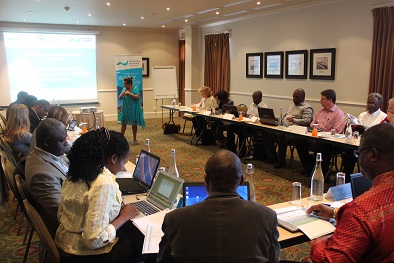As a technical expertise with convening power, GWP SA brought together stakeholders contributing to the social and political change processes that help bring the vision of a water secure world closer to reality. Additionally, as a long standing initiative introducing IWRM courses in a network of universities in the Southern Africa region, WaterNet Representatives of the universities present at the workshop shared their experience from IWRM-oriented courses. As such, the discussions during the workshop provided an avenue for professionals to share experiences, discuss and analyze the various elements of the IWRM process, and the prioritisation of actions aimed at improving water governance and management, as well as engaging with a broader community for the solution of water related problems that tackle development.
The 29 participants of the workshop, of whom 9 are women, comprised academia from the following countries: South Africa, Tanzania, Zambia, Zimbabwe, Malawi, Botswana, and Namibia. The workshop was opened by GWP SA’s Executive Secretary, Ms Ruth Beukman, who in her opening remarks encouraged participants to openly share their experiences so that participants could become more involved in the implementation of government policy and the effective dissemination of information on IWRM tools, principles and practices at local, regional and national levels.
The workshop focused on presenting the features of the GWP ToolBox initiatives; a free on-line library administered by GWP and containing tools that act as guidelines on how to implement IWRM, case studies that illustrate how the tools work in practice and references such as supporting documents, manuals, papers and external IWRM knowledge databases. Dr. Danka Thalmeinerova, Senior Knowledge Management Officer (GWPO), presented the GWP Knowledge Management approach including the various types of knowledge products developed by GWP. The presentation also focused on the evolution of the ToolBox, and a summary of regional workshops conducted with partners’ universities in other regions. These presentations were followed by overview of the WaterNet Masters Programme which were given by Dr. Hodson Makurira, (University Zimbabwe) and Dr. Jean-Marie Kileshye-Onema (WaterNet Manager).
The workshop programme also involved participants sharing examples and creating awareness of how the Toolbox has been used in the WaterNet IWRM Masters training programme from WaterNet member universities in the region. In addition, expériences were shared on regional knowledge management and capacity building programmes ; namely the SADC Capacity building programme, GWP SA’s work programme in the SADC context and the African Water Climate & Development capacity development programme being implemented in the Limopop basin in Mozambique and Zimbabwe. Issues of sustainability in research were also discussed and the Water Research Fund for Southern Africa, which is currently under revision, was discussed as a possible viable support mechanism for promoting research for development in the region. Participants agreed to take discussions further in ensuring that the Water Research Fund becomes fully operational in Southern Africa.
Apart from discussions on the revival of the Water Research Fund, the workshop resulted in a number of outcomes such as increased understanding and recommendations on the improvements, uptake and contributions to the GWP IWRM Toolbox. Participants also made recommendations on how to strengthen GWP-SA and WaterNet partnership in ‘research for development’ and ‘responsive professional and ‘institutional capacity development’. Participants also agreed to the upscaling of current institutional capacity development programmes and projects to other member states and basins.
GWP-SA and WaterNet have collaborated on promoting and developing capacity in the SADC region on IWRM since 2000. The driving force behind this workshop was necessitated by the need to institutionalise and sustain project outputs, tools and capacity development materials and approaches. All aimed at ensuring that the developmental benefits of IWRM projects may continue long after projects have ended.
